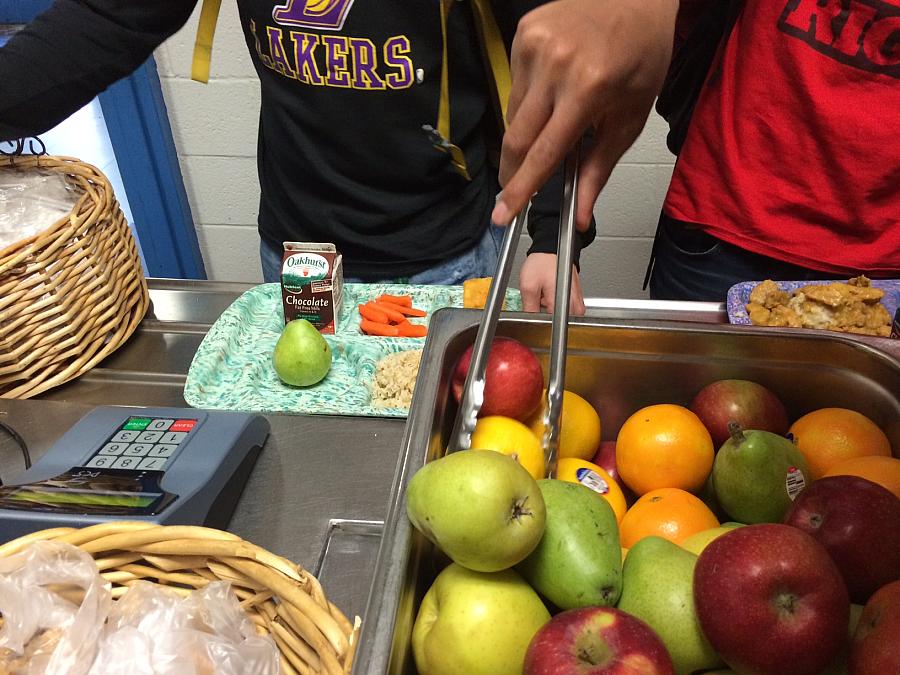Series on obesity and poverty calls for new approach to finding reluctant sources

A student goes for a healthier item during lunch at Lewiston High School Cafeteria in Maine, while chocolate milk lurks in the background. (Photo by Patty Wight)
In Maine, about one-third of adolescents are overweight. That’s more than 36,000 kids, and nearly half of them are considered obese. Pediatricians call it an epidemic, and it’s one that’s 30 years in the making. A variety of factors — environmental, cultural, and societal — contribute to the problem. But one factor in particular stands out for putting kids at greater risk of being overweight: poverty. The 2012 National Survey of Children’s Health found in general, the lower the household income, the higher the rate of children who are overweight or obese.
Poverty is an area I’ve wanted to devote more reporting to, and as our station’s health reporter, I found a fitting angle: The perceived paradox of childhood poverty and obesity. As a 2015 National Fellow and Dennis A. Hunt grantee, I wanted to highlight these two, easily stereotyped issues, and give them the attention they deserve.
Personal stories would drive the series, but I began by talking to experts to get a better understanding of the extent of the childhood obesity problem in Maine, the reasons behind it, and possible solutions. My hope was that these experts and advocates would lead me to families and kids who would be willing to share their stories with me, but this turned out to be the most challenging part of my project. I chose not just one, but two subject areas that most people are reluctant to talk about: How much they weigh, and how much money they make.
Some parents were willing to talk about their children’s weight, but they didn’t want to divulge information about their income, and vice versa. I had contacts that initially agreed to talk with me, even gave interviews, but later cancelled or asked not to be included in the series after their spouses opposed. It was understandable, and also, as a reporter, frustrating. There were a few times when I felt I had reached a dead end. I worried that my stories would be missing the critical first-person experiences needed to bring the issues surrounding obesity to life.
As a result, I changed some of my reporting strategies. Typically, I’m conservative when reaching out to my network for contacts. If I ask too many, I won’t be able to use everyone’s voice, and I don’t want people I’ve interviewed or those who helped me find them to feel that they wasted their time. It’s a strategy that’s worked well for me in the past, but not for this project. Because of the challenge of finding people willing to talk about both obesity and poverty, I shifted from parsing out requests to pulling out all the stops. I sent a flood of emails and phone calls to an ever-expanding list of experts, advocates, and others just to find a few people willing to talk about their personal experiences.
All of those requests ultimately paid off. I produced a five-part series that explored different ways kids and families can develop healthier habits on a low income. One family allowed me to visit their home while a nutrition worker offered goals and strategies for healthier meals. A mom let me follow her on her weekly, multi-store shopping trip as she hunted for the best deals on healthy food with a food-stamp budget. Schools in impoverished communities showed how they’re changing cafeterias and their school days to help students eat healthier and get more exercise. A doctor’s office that has devised an intensive program to help overweight kids develop healthy habits showed me the connection between mental health and weight issues. During the week the series aired, our station also did a call-in show to engage listeners and generate a statewide conversation on poverty and obesity.
This series was the most challenging project I’ve tackled in the four years I’ve been at Maine Public Broadcasting — even more challenging than a ten-part series I did about mental health. But I’m proud that I reported on two, intertwined chronic issues that deserve more attention. One lesson I’ll walk away with is to more carefully consider how much to broaden or narrow the scope of an intensive reporting project. While narrowing focus often strengthens a series, for difficult-to-discuss topics, it may make sense to broaden the scope, and include those narrower areas of focus as just one aspect of the project.
Both obesity and poverty are issues that don’t show signs of abating any time soon. Though obesity levels in Maine have leveled off in recent years, they’re still high. As one expert told me, it took 30 years to get to this point. It’s going to take more than a few years to solve it. That means there’s plenty more work, and reporting, to do.
Read Patricia Wight’s fellowship series here.

